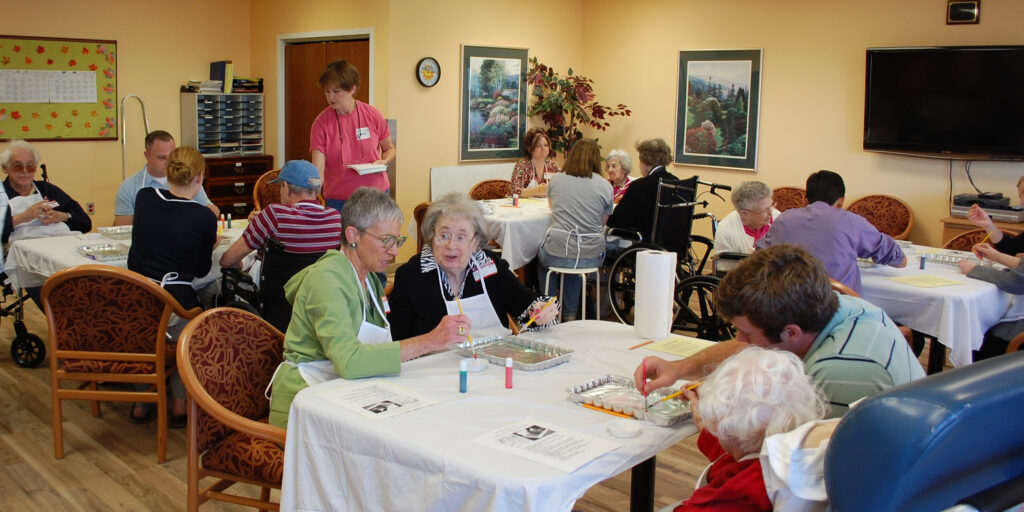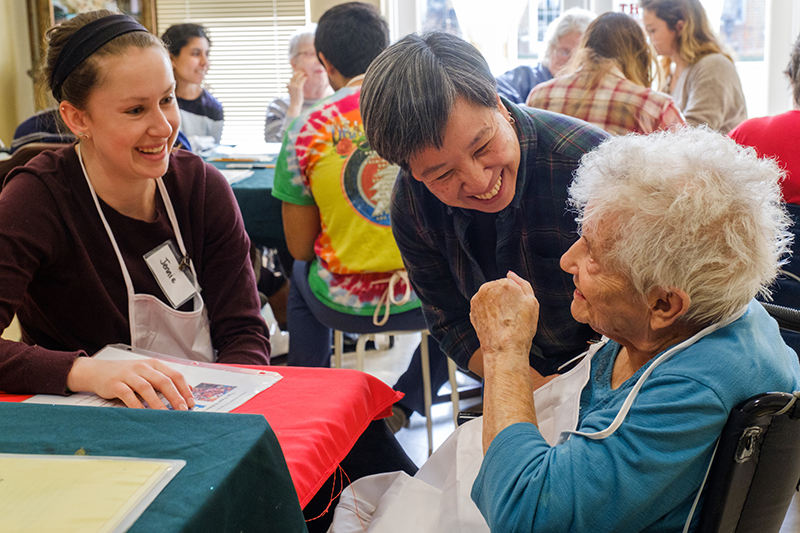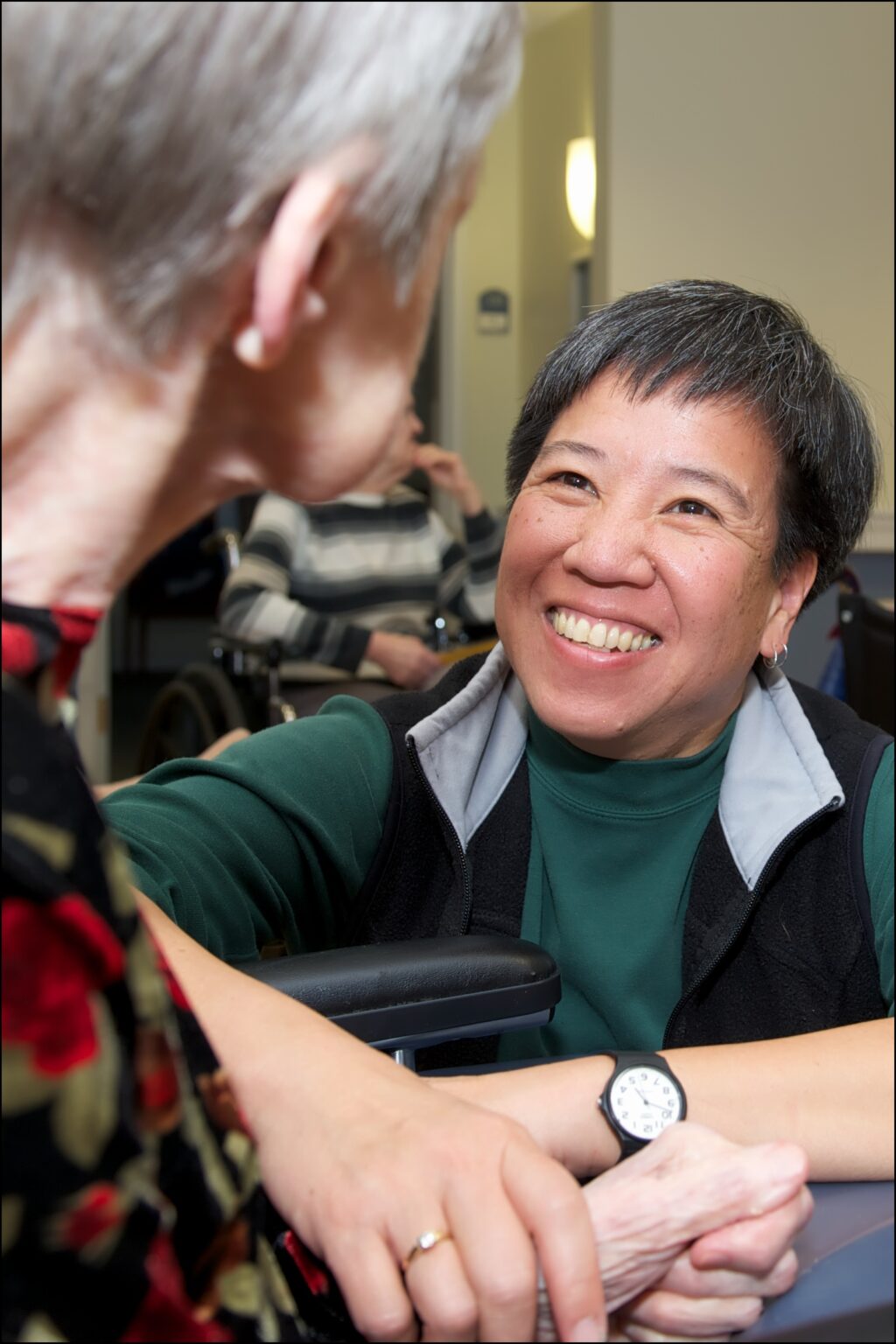A Few Key Principles to Enhance Your Time Together
In every caregiving exchange you will discover how helpful it is to honor the following principles. See if you can give attention to one or two principles each time you use this guide with your care partner.
Adaptation
Make small adjustments that honor the capacity of your care partner. If they are not able to repeat words of a song, then simply encourage them to hum with you. The lessons can be adapted for every cognitive and physical level.
Examples:
- “Let’s hum the song and you sing the words each time they come to you!”
- “I know that it is a bit of a stretch to raise your arms. What if we tap our fingers together to the music or pat our hands on your legs?”
- “Let’s look at the window and trace the outline of the tree with our fingers.”
Adulthood/Personhood
Remember that we are each unique and accomplished adults. Though there may be cognitive decline, we address our partner as an adult rather than as a child. We work to embrace the full humanity of our shared adulthood in both content and tone of voice.
Examples:
- “This really expresses your inner spirit.” rather than “Oh, what a pretty little picture you drew.”
- “Let’s work to tap your creativity while we move together” rather than “Let’s do a little dance.”
Anticipation
Anticipate something wonderful! You will soon learn that every individual is capable of great beauty.
Examples:
- “Oh dad, I can’t wait to see what the grandkids think of your work!”
- “I wonder what color you are going to choose next?”
Attention
Bring full attention to your care partner and the lesson.
Example:
“We are taking this time, just the two of us, to learn something together.”
Autonomy
Your care partner always makes the choices. You provide the framework and they make the decisions. This returns a powerful degree of autonomy that is often lost in the progression of cognitive disorders.
Examples:
- “What would you like to do now/next?”
- “What do you think this needs to look like?”
- “Where would you like to go from here?”
Encouragement
Always encourage yourself and your care partner. You are doing something remarkable. Though it might seem a challenge at first, encourage yourself to embrace the process and celebrate small accomplishments.
Examples:
- “Let’s stretch ourselves to learn something new just like great artists do it.”
- “I know you can do it.”
- “I am learning how to do this too. How do you think we did?”
Gentleness
As a caregiver we work to offer our most gentle and kind words and actions. We are kind to ourselves as caregivers and kind to our care partners as companions on a shared journey.
Example:
“Are you getting a bit tired? Can we rest a moment? All of this creativity makes me a little tired too.”
Honor
Honor the creative capacity of your care partner within their changing circumstances. The goals is to imagine what they CAN do without pressure. Give high regard to the innate capacity for creativity and beauty that make us beautifully human beings.
Example:
“I see that you got the giggles when we were singing. Shall we sing some more and have a good laugh?”
Inclusion
Celebrate and integrate the remarkable spectrum of social, cultural, ethnic, community, faith, gender, and generational diversity that is readily available.
Examples:
- “Let’s look online at some museums in Mexico to find some art that reminds you of home.”
- “What are some of your favorite French songs? We can look up online and then you can help me pronounce the words when we sing them.”
Mastery
Recognize that both you and your care partner are capable of mastering these lessons. You WILL learn ways to provide a quality day for your care partner. And your care partner will surprise you with their capacity for creativity, humor, and beauty. You will both master different ways of experiencing the caregiving process.
Examples:
- “How beautifully you applied that paint.”
- “You have taken such great care with placing those leaves. It takes my breath away.”
- “You just taught me how to move with flare!”
- “Can you believe that we just wrote such a powerful poem?!”
Non-Judgment
A wrong way does not exist! Learn to discover wonder and surprise in every act of intention, without judging the experience.
Examples:
- ”What a wonderful choice you made!”
- “I never would have thought of that.”
Reciprocity
Recognize that your caregiving partner has much to offer when we remain open.
Examples:
- “I had forgotten what it was like to sing with gusto. I always hold back. Thank you for teaching me that lesson again.”
- “I learn so much from you every time we work on a project together.”
Reminiscence
One of the gifts of these creative practices is that you will soon discover the wonderful long-term memories that remain beyond the fading of short-term memory. Take a journey with your care partner to the time and place of their choosing and let it become a fresh memory in the here and now. You may find yourself dancing at a USO during the war, picking flowers along a lake in Mexico, or riding a train to New York. Wherever they are, make the journey with them. Ask how things taste, smell, sound, look, and feel.
Examples:
- “Oh mom, I hadn’t remembered that in years.”
- “Oh, so you are at your home in Virginia. What do you see? What does it smell like? Are there flowers? What color are they?”
- “What is that tune again? How does it go?”
- “It sounds like you are in San Francisco. What was it like living in San Francisco? What is your favorite food there? What does the fog look like when it comes over the hills?”
Respect
Respect guides every interaction with adults who have cognitive disorders. Treat them as equals worthy of our shared humanity for the lives they have lived and continue to live.
Examples:
- “I see how you work hard to create wonderful things.”
- “Thank you for teaching me about life today.”
- “You are so creative. You help me enjoy life by watching you create.”
- “I so respect you for trying this.”
Savor the Moment
Savoring together is the heart and power of creative caregiving. If we are able to recognize each moment as a jewel of creativity, then our daily routines can be enriched in ways that allow us to flourish. Recognizing creativity in the way we conduct our everyday activities—cooking, cleaning, grocery shopping, walks, and going to bed—will provide remarkable opportunities for storytelling.
Examples:
- “This is one of the most wonderful feelings, being here with you right now!”
- “I am having so much fun creating something together. It makes the afternoon seem like having a party!”
- “I am rejuvenated when we laugh together like this.”
And above all else…
HAVE FUN!
We really mean it. Physical, emotional, and social benefits are all enhanced when we have fun!


